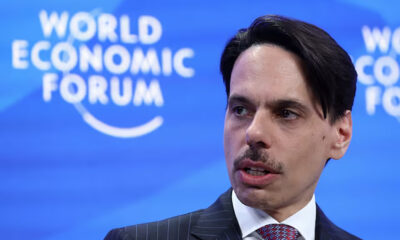COVID-19
Austrians protest against COVID-19 restrictions, mandatory vaccination

Hundreds of protesters demonstrated against Austria's COVID-19 measures and mandatory vaccination on Saturday at a rally in Vienna's Heldenplatz square.
The protesters waved Austrian flags and displayed placards with slogans against mandatory vaccination.
Austria introduced mandatory vaccinations at the start of February, with the health ministry saying people who have not been vaccinated by March 15 will be committing an administrative offence.
From March 15, police will carry out random checks such as at road blocks and offenders will face legal proceedings.
"We don't need this, we don't want this," said one protester who didn't wanto to be named. "The dangers are in no way justifiable and completely outrageous," he added, referring to COVID vaccinations.
People aged 18 and over with an address in Austria are affected by the new regulation, according to Austria's health ministry
Saturday's demonstration coincided with Austria eliminating the so-called "2G rules" barring those who are not vaccinated against or recovered from the virus from entering non-essential shops.
Since Nov. 15 those not fully vaccinated have been under lockdown, meaning they are only allowed to leave their homes for a limited number of reasons such as shopping for essentials or working. The measure, which was suspended over Christmas, has been criticised as very difficult to enforce.
Now, alongside entering shops Austria will also ease measures barring the unvaccinated from restaurants from Feb. 19, allowing those with a negative COVID test result to visit restaurants and tourist attractions.
However, those who are not vaccinated against or recovered from the virus remain barred from taking part in a range of leisure activities, including eating in restaurants or shopping for non-essential items.
COVID-19
WHO declares end to COVID global health emergency

The World Health Organization said Friday that COVID-19 no longer qualifies as a global emergency, marking a symbolic end to the devastating coronavirus pandemic that triggered once-unthinkable lockdowns, upended economies and killed millions of people worldwide.
The announcement, made more than three years after WHO declared the coronavirus an international crisis, offers some relief, if not an ending, to a pandemic that stirred fear and suspicion, hand-wringing and finger-pointing across the globe, AP reported.
The U.N. health agency’s officials said that even though the emergency phase was over, the pandemic hasn’t finished, noting recent spikes in cases in Southeast Asia and the Middle East.
WHO says thousands of people are still dying from the virus every week, and millions of others are suffering from debilitating, long-term effects.
“It’s with great hope that I declare COVID-19 over as a global health emergency,” WHO Director-General Tedros Adhanom Ghebreyesus said.
“That does not mean COVID-19 is over as a global health threat,” he said, warning that new variants could yet emerge. Tedros noted that while the official COVID-19 death toll was 7 million, the real figure was estimated to be at least 20 million.
Tedros said the pandemic had been on a downward trend for more than a year, acknowledging that most countries have already returned to life before COVID-19.
He bemoaned the damage that COVID-19 had done to the global community, saying the pandemic had shattered businesses, exacerbated political divisions, led to the spread of misinformation and plunged millions into poverty.
When the U.N. health agency first declared the coronavirus to be an international crisis on Jan. 30, 2020, it hadn’t yet been named COVID-19 and there were no major outbreaks beyond China.
More than three years later, the virus has caused an estimated 764 million cases globally and about 5 billion people have received at least one dose of vaccine.
In the U.S., the public health emergency declaration made regarding COVID-19 is set to expire on May 11, when wide-ranging measures to support the pandemic response, including vaccine mandates, will end. Many other countries, including Germany, France and Britain, dropped most of their provisions against the pandemic last year.
When Tedros declared COVID-19 to be an emergency in 2020, he said his greatest fear was the virus’ potential to spread in countries with weak health systems.
Most recently, WHO has struggled to investigate the origins of the coronavirus, a challenging scientific endeavor that has also become politically fraught.
COVID-19
COVID-19 in Iran: Nearly 900 new cases, 24 deaths recorded

The Iranian health ministry announced on Sunday that more than 890 new cases of COVID-19 have been identified across the country during the past 24 hours, adding that 24 patients have died in the same period of time, Fars News Agency reported.
"A sum of 891 new patients infected with COVID-19 have been identified in the country based on confirmed diagnosis criteria during the past 24 hours," the Iranian Health Ministry's Public Relations Center said on Sunday, adding, "454 patients have been hospitalized during the same time span."
The ministry’s public relations center said 611 people infected with COVID-19 are in critical condition.
COVID-19
China says 200 million treated, pandemic ‘decisively’ beaten

China says more than 200 million of its citizens have been diagnosed and treated for COVID-19 since it lifted strict containment measures beginning in November.
With 800,000 of the most critically ill patients having recovered, China has “decisively beaten” the pandemic, according to notes from a meeting of the ruling Communist Party’s all-powerful Politburo Standing Committee presided over by President and party leader Xi Jinping, AP reported.
China enforced some of the world’s most draconian lockdowns, quarantines and travel restrictions and still faces questions about the origins of the virus that was first detected in the central Chinese city of Wuhan in late 2019. Heavy-handed enforcement prompted rare anti-government protests and took a heavy toll on the world’s second-largest economy.
The official Xinhua News Agency quoted Xi as saying that policies to control the outbreak had been “entirely correct.” The abrupt lifting in November and December of the “zero COVID” policy that had sought to eliminate all cases of the virus led to a surge in infections that temporarily overwhelmed hospitals.
Case numbers have since peaked and life has largely returned to normal, although international travel in and out of China has yet to return to pre-pandemic levels.
China is now transitioning to a post-pandemic stage after a fight against the outbreak that was “extraordinary in the extreme,” Xinhua said.
The government will continue to “optimize and adjust prevention and control policies and measures according to the times and situations with a strong historical responsibility and strong strategic determination,” Xinhua said.
-

 Regional2 days ago
Regional2 days agoHamas frees hostages, Israel releases Palestinian prisoners on day one of ceasefire
-

 World4 days ago
World4 days agoIsraeli cabinet approves Gaza ceasefire accord, due to take effect Sunday
-

 Sport4 days ago
Sport4 days agoILT20: Fernando blasts Sharjah Warriorz to a big win over Dubai Capitals
-

 Latest News4 days ago
Latest News4 days agoIndia says it seeks to strengthen relationship with Afghanistan
-

 Latest News5 days ago
Latest News5 days agoOver 1,500 emerald mines discovered in Panjshir: Local officials
-

 Latest News3 days ago
Latest News3 days agoTrump’s National Security Adviser says troops will not return to Afghanistan
-

 Latest News4 days ago
Latest News4 days agoEU launches 36 million euros project to support displaced Afghans
-

 World2 days ago
World2 days agoTrump promises harsh immigration crackdown on inauguration eve
























